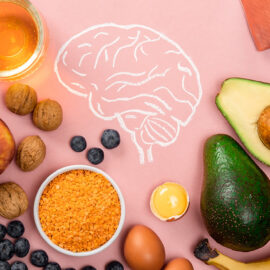Inflammatory bowel disease (IBD) is an umbrella term used to describe disorders that cause chronic inflammation of the gastrointestinal (GI) tract. Despite having similar acronyms and symptoms, irritable bowel syndrome (IBS) and IBD are two distinct GI disorders, which require very different modes of treatment. Therefore, getting an accurate diagnosis is essential for managing IBD properly.
Two of the most common forms of IBD are Crohn’s disease (CD) and ulcerative colitis (UC). While there are specific criteria for each diagnosis, both fall under the umbrella of IBD as they present with similar symptoms including diarrhea, abdominal pain, nausea, and unintentional weight loss. CD typically involves patchy ulcerations next to areas of healthy tissue throughout the GI tract, whereas UC causes continuous ulcerations throughout the lining of the colon. As a result of dietary limitations, both conditions may cause poor nutrient absorption, resulting in malnutrition and vitamin and mineral deficiencies.
According to the Crohn’s & Colitis Foundation of America (CCFA), as many as 70,000 new cases of IBD are diagnosed each year. Between 1999 and 2017, research studies revealed a substantial increase in the prevalence of IBD globally, which is expected to continue rising in the future.1 This alarming trend, which has been associated with shifts toward a Westernized diet, has encouraged more research on the relationship between nutrition and IBD, including diet as a powerful treatment.2 In addition to medical nutrition therapy, common treatments for IBD involve symptom management and an attempt to encourage or maintain remission with the use of antibiotics and immunosuppressive drugs.
Over the last two decades, the use of exclusive enteral nutrition (EEN) in the induction of remission of active CD has been well-established and supported by research with success for both children and adults.3 The protocol for EEN involves the use of a nutritionally complete liquid diet, instead of solid foods, to provide 100% of caloric needs for up to 8 weeks. Post completion, foods are slowly reintroduced while being closely monitored by a medical team. In many countries, EEN is the first line of therapy for induction of remission in most children and adolescents with newly onset CD. Aside from its positive impact on luminal CD, EEN has also been shown to have a positive impact in penetrating and stricturing CD, however more studies are needed to support this. While most reports have focused on the benefits of EEN for uncomplicated luminal CD, emerging research has shown that EEN is safe and beneficial for cases of complicated CD, as well.4 While EEN has shown immense promise for patients with CD, definitive data to support its role for the management of active UC is lacking.
With malnutrition being a common complication of IBD, and indicators of poor prognosis in hospitalized patients, early screening and proactive nutrition management with a multidisciplinary team approach is vital. According to the European Society for Clinical Nutrition and Metabolism (ESPEN), optimizing nutrition status may improve outcomes for patients with IBD, further reinforcing the importance of IBD patients receiving nutrition counseling as part of the multidisciplinary team approach. Furthermore, nutrition counseling may help to prevent malnutrition or other nutrition-related disorders.
In an effort to support individuals suffering with IBD-related conditions who are seeking cleaner nutrition as part of their regimen in conjunction with EEN, the Orgain Organic All-In-One Nutritional Shake, offered in grass-fed dairy or plant-based, is a great option. Since nutritional needs vary between individuals, further supplementation may be necessary.
Registered Dietitian Nutritionists continue to successfully use Orgain products as part of partial enteral nutrition (PEN) or EEN therapy to ensure adequate calorie and nutrient intake in CR. Here is one of many testimonials shared by healthcare professionals about their experience with using Orgain for IBD.
“Orgain is an easy to digest, high protein, nutritious beverage that my patients use when unable to tolerate various solid food. Orgain is used as a supplement to enhance the nutritional status of my compromised patients who suffer from both IBS and IBD.” – Lori, Gastroenterology Dietitian
To learn more about the latest updates on research for IBD, check out the following resources:
- The Crohn’s & Colitis Foundation
- National Institute of Diabetes and Digestive and Kidney Diseases
- John Hopkins Medicine – Crohn’s Disease
1 Alateb, S et al. The Lancet. 2020; 5(1): 17-30, doi: https://doi.org/10.1016/S2468-1253(19)30333-4
2 Green, N et al. Nutrients. 2019; 11(5): 947, doi: 10.3390/nu11050947
3 Adamji, M et al. Intest Res. 2019; 17(2): 171-176, doi: 10.5217/ir.2018.00079
4 Yang, Q et al. Scand J Gastroenterol. 2017; 52(9), doi: 10.1080/00365521.2017.1335770



